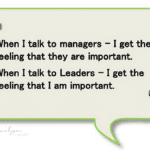There appears to be a full blown rebellion of the annual performance review. I’m still not convinced that the answer is to ditch the appraisal process. Even if your organization has transitioned to a series of shorter feedback sessions instead of the annual review, it’s possible the symptoms that plague the annual review will surface: manager bias, lack of valuable feedback, inconsistency, etc.
But as I was typing the list of challenges facing performance reviews, it occurred to me…I wonder if some of these symptoms are due to manager fatigue and burnout? Think about it, we talk about employee stress all the time. If employees are overwhelmed, what are the chances that the manager is overwhelmed too?
We know well-being has an impact on employee engagement and performance. It only seems logical that manager well-being has an impact on manager’s engagement and performance too. Organizations need to address manager well-being if they want managers to be effective coaches and mentors within their teams.
The reason I’m bringing this up is because sometimes organizations hold managers accountable at a different level. Last minute deadline? The manager can stay late to handle it. Understaffed and no overtime in the budget? The manager will come in on their day off. Now managers also get the benefit of occasionally walking in the door late or leaving early too. But we have to make sure the relationship is one of give and take, versus always in the company’s favor.
Well-being has an impact on performance management. If managers don’t feel good and aren’t on top of their game, how can they be expected evaluate someone else’s performance objectively?
While I’m on the subject, let’s take this conversation one step further. How can human resources effectively manage the performance management process if they are stressed out? I think it’s time we recognize that well-being applies to management and human resources too. I’ll admit it, there are times when HR is so busy making sure everyone else has balance, they forget about themselves. And sometimes it’s a challenge to admit that we need time to recharge.
Organizations cannot view the need for well-being as being selfish. It’s self-awareness. Each individual must learn to identify their stressors and understand how to manage them. If organizations expect employees to perform at a high level, they must have well-being. That goes for human resources and management too. Otherwise the performance management system isn’t operating at full effectiveness.
Image taken by Sharlyn Lauby while attending the Great Place to Work Conference
0








David says
Good article.